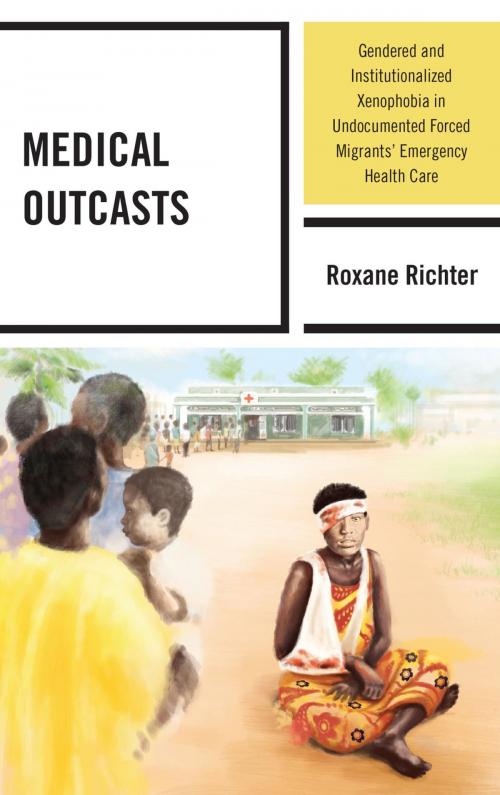Medical Outcasts
Gendered and Institutionalized Xenophobia in Undocumented Forced Migrants' Emergency Health Care
Nonfiction, Social & Cultural Studies, Political Science, Politics, Social Services & Welfare| Author: | Roxane Richter | ISBN: | 9781498525459 |
| Publisher: | Lexington Books | Publication: | December 24, 2015 |
| Imprint: | Lexington Books | Language: | English |
| Author: | Roxane Richter |
| ISBN: | 9781498525459 |
| Publisher: | Lexington Books |
| Publication: | December 24, 2015 |
| Imprint: | Lexington Books |
| Language: | English |
As witnessed through the firsthand experiences of a frontline activist and international medical aid practitioner, this biosocial political study gives voice to the inequities in undocumented Mexican and Zimbabwean women’s emergency healthcare access and treatment in Houston, United States of America, and Johannesburg, South Africa. As a construct of feminist transdisciplinary fieldwork, this research utilizes methodological pluralism and biosocial disparities to examine constructs of “social determinants” or “social origins” of women’s suffering, disease, and healthcare access. These variables include gender inequity, xenophobia, structural violence, political economy subjugation, healthcare access and delivery disparities, and human rights violations.
Illustrated through 24 purposive interviews, this seven-year study shows Zimbabwean women sought out emergency care at a rate 16 times higher than their Mexican counterparts—but reported lower instances of domestic violence and depression. Most notably, the Zimbabwean women reported communicable diseases at double the rate of the interviewed Latinas. However, the most surprising finding of the study was the high number of Mexican women, some 60%, who cited depression as one of their indications for seeking emergency healthcare.
The study indicated that the reality of many forced migrants’ experiences in claiming their accorded healthcare rights was more theoretical than practical in its distribution and disposition. Particularly, sovereign freedom and civil justice were not being conferred to these women according to the two host country’s mandated Constitutional precepts, and/or emergency medical aid mandates, and social, gender, aid, and human rights justice directives. Thus the role of government in shaping these systemic and institutionalized ideologies will be examined, as well as paradigms that effect national healthcare expenditures, subsidies, and public health risks. The intention of this study is not to provide definitive recommendations of specific forced migration policies that have a civic and/or partisan duty to be executed, but rather to serve as an illustration of how these social tenets, inequitable power relations, and political economy subjugation directly impact socioeconomically disadvantaged women’s health, livelihood, and human rights.
As witnessed through the firsthand experiences of a frontline activist and international medical aid practitioner, this biosocial political study gives voice to the inequities in undocumented Mexican and Zimbabwean women’s emergency healthcare access and treatment in Houston, United States of America, and Johannesburg, South Africa. As a construct of feminist transdisciplinary fieldwork, this research utilizes methodological pluralism and biosocial disparities to examine constructs of “social determinants” or “social origins” of women’s suffering, disease, and healthcare access. These variables include gender inequity, xenophobia, structural violence, political economy subjugation, healthcare access and delivery disparities, and human rights violations.
Illustrated through 24 purposive interviews, this seven-year study shows Zimbabwean women sought out emergency care at a rate 16 times higher than their Mexican counterparts—but reported lower instances of domestic violence and depression. Most notably, the Zimbabwean women reported communicable diseases at double the rate of the interviewed Latinas. However, the most surprising finding of the study was the high number of Mexican women, some 60%, who cited depression as one of their indications for seeking emergency healthcare.
The study indicated that the reality of many forced migrants’ experiences in claiming their accorded healthcare rights was more theoretical than practical in its distribution and disposition. Particularly, sovereign freedom and civil justice were not being conferred to these women according to the two host country’s mandated Constitutional precepts, and/or emergency medical aid mandates, and social, gender, aid, and human rights justice directives. Thus the role of government in shaping these systemic and institutionalized ideologies will be examined, as well as paradigms that effect national healthcare expenditures, subsidies, and public health risks. The intention of this study is not to provide definitive recommendations of specific forced migration policies that have a civic and/or partisan duty to be executed, but rather to serve as an illustration of how these social tenets, inequitable power relations, and political economy subjugation directly impact socioeconomically disadvantaged women’s health, livelihood, and human rights.















